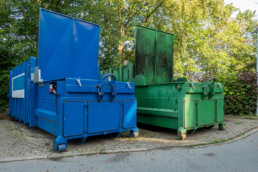Starting from 6th April 2024, new regulations will be introduced in Wales that will require all non-domestic premises, such as businesses, charities, public sectors, and those who collect, keep, treat, or transport waste from non-domestic premises, to separate key recyclable materials.
Non-domestic premises must separate and present nine specified recyclable waste materials in a minimum of six separate recyclable waste streams. These materials are:
- glass
- cartons and similar, metal and plastic
- paper and card
- food waste from premises that produce 5 kilograms or more of food waste in seven consecutive days
- unsold small waste electrical and electronic equipment
- unsold textiles
Bans will also be in place from 6th April 2024, on the disposal of food waste to sewer from non-domestic premises, specified separate recyclable waste streams going to incineration plants and landfills, and all wood waste going to landfill.
These changes to the law aim to help the country work towards becoming a zero-waste nation and reducing carbon emissions by 2050. Separating and sorting recycling in workplaces should ensure greater volumes of high-quality recycling are produced and much less waste sent to landfill and for incineration.
Failure to comply with the separation requirements will be considered an offence, and there will be no upper limit on the courts' power to fine. Instead of criminal prosecution, a civil sanction may be issued for non-compliance with the separation requirements.
While we have a legal responsibility under the Environmental Protection Act 1990 'duty of care', should England adopt these more stringent regulations regarding separation of recyclable waste in order to achieve a greener future and promote sustainability? Many organisations in England currently do not have a waste strategy in place and do not separate recyclable waste from non-recyclable. However, commercial recycling plays a crucial role in ensuring sustainability. It is important for businesses to actively participate in these efforts.
For more detailed information about the Waste Separation Requirements (Wales) Regulations 2023, please refer to the Welsh Government code of practice. If you're a business and are looking to adopt a waste and recycling strategy get in touch.
International Women’s Day - Invest in Women: Accelerate Progress
Robyn Brook and Clare Verity are the founders of Footprint Recycling. Here, they share their experience as women in waste and the critical role women play in the industry.
Clare:
“Prior to establishing Footprint Recycling, I was employed in the waste management sector, where I found my job to be personally fulfilling and environmentally rewarding. During my pregnancy with my second child, I was motivated to utilise my expertise and passion for the industry to start my own business. That’s when my business partner, Robyn, and I founded Footprint Recycling 16 years ago.
“As a female-owned business in a male-dominated industry, we understand the importance of supporting and empowering our younger colleagues as they develop their careers. This year’s International Women’s Day theme, “Invest in Women: Accelerate Progress,” serves as a reminder to provide equal opportunities for education, training, and professional development to women in waste. Through our efforts, we aim to promote gender equality and help women achieve their full potential in the industry and make positive changes.”
Robyn:
“Over the years, it’s been great to see more women join the waste and recycling industry and I am proud of the fact that Footprint was founded by women and women make up many of the key roles within our organisation. It’s a testament to the progress made since we began our journey. International Women’s Day is an excellent opportunity to acknowledge and celebrate this, and the valuable contributions women are making across all areas of the waste industry.
“At Footprint, one of our core values is ‘respect’. We live by this. It is the bedrock of everything we do, and we feel strongly that celebrating gender diversity is important. It fosters a more inclusive workplace and brings a variety of perspectives and experiences to the table, promoting better problem-solving, decision-making, and, ultimately, success for our business.
“I am inspired by our team and of what Clare and I have accomplished for women and diversity in waste.”
Women’s roles are essential to our industry’s success, especially with the growing shift towards viewing waste as a resource. The industry is moving away from traditional landfill practices and towards waste prevention and a circular economy. Women have seen the industry’s huge potential, and through their assertiveness and progressive attitude, women can help shape the industry’s future towards a more efficient and sustainable future.
If you’d like to work with Footprint Recycling, get in touch for an informal chat.


